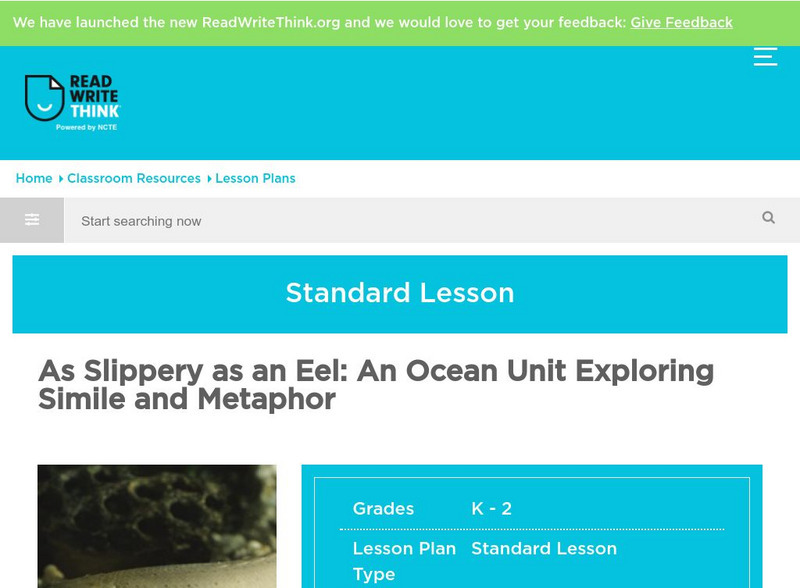Hi, what do you want to do?
Curated OER
Figurative Language
Twelfth graders examine personification and alliteration in various reading selections. They read magazine articles, brochures, and advertisements, identify the examples of personification and alliteration, and create a business name...
Curated OER
Poetry
Fifth graders read several poems by famous poets and identify what about their style makes them unique. They then analyze and compare poetic style, use of forms and themes. Next, 5th graders investigate and collect different examples of...
Curated OER
Those Cells Look Good Enough to Eat
Students explore the parts of the cell. In this cell lesson plan, students use foods to create cell models that represent the nucleus, cytoplasm, cell membrane, mitochondria, ribosomes, vacuoles, endoplasmic reticulum, and Golgi bodies...
Curated OER
Short Story
Seventh graders identify the various elements of a short story. After reading Rudyard Kipling's short story, "Rikki-Tikki-Tavi," students identify the author's purpose in writing the story as well as the elements that make it a short...
Curated OER
"Compression of Emotional Power"--Responding To Unseen Poetry
Eleventh graders identify the structure, rhythm and style of a selected poem, experience utilizing poetic devices and analyze an annotated poem. They evaluate the themes and inferred meanings to a variety of poems from their textbooks.
Curated OER
Christmas Poetry
Students explore writing using literary terms. In this Christmas poetry lesson, students write a poem about a Christmas tree or a snowman using at least one example of each: metaphor, simile, and personification.
Curated OER
You're Hired!
Students participate in a simulation of being a speech writer for the President. They listen to and analyze speeches and present one of their own.
Curated OER
A Courtly Love Poem
Students engage in a writing assignment to produce a thirteenth century Italian Courtly Poem. They imitate the literary patterns of writing to produce a unique poem using a model for example. Students review the basic terminology for...
Curated OER
Your Future Occupation
Students write a story about themselves as the main character in a work situation. For this writing perspectives lesson, students brainstorm about their future occupation. Students then use themselves as the main character in a short...
Curated OER
Poetry
Sixth graders research famous poets. In this poetry lesson plan, 6th graders investigate poets and discover their famous literary works. Students conduct research using Internet resources and prepare a presentation.
Curated OER
Laundry List of Idioms
Fifth graders think of idioms related to laundry as they create a laundry list of idioms.
Curated OER
Divulging in Detail
Learners rely on their senses to write descriptions of an object within their view. They incorporate different parts of speech in their descriptions. They write a descriptive paragraph about their object.
Read Works
Read Works: 4th Grade Lesson: Similes and Metaphors
[Free Registration/Login Required] A lesson in which young scholars use the book Poetry for Young People: Langston Hughes edited by David Roessel and Arnold Rampersad to learn to identify and understand the use of simile and metaphor in...
ReadWriteThink
Read Write Think: An Ocean Unit Exploring Simile and Metaphor
Contains plans for four lessons that teach students about similes and metaphors using ocean themed resources. In addition to objectives and standards, this instructional plan contains links to sites used in the lessons as well as...
TES Global
Tes: Teaching Shakespeare: Sonnet 130 Year 7
[Free Registration/Login Required] This lesson plan for Shakespeare's "Sonnet 130" asks students to mark the rhyme scheme and highlight similes and metaphors, to respond to a modern letter with a message similar to the sonnet, and to...
Alabama Learning Exchange
Alex: Figurative Language
This lesson used a slideshow presentation to explain the difference between similes and metaphors. Students are challenged to identify these figurative elements in literature and then create some themselves.
Read Works
Read Works: 3rd Grade Lesson: Poetry
[Free Registration/Login Required] A lesson in which students use two provided poems to learn to identify and understand the use of similes and metaphors in poetry. Lesson includes direct teaching, guided practice, and independent...
ReadWriteThink
Read Write Think: Figurative Language Awards Ceremony
Contains plans for five to seven lessons that teach about figurative language like similes, metaphors, and personification by asking students to write award acceptance speeches that incorporate them. In addition to objectives and...
Love To Know Media
Your Dictionary: Literary Terms Lesson Plan
This is a lesson plan for teaching the seven literary terms used in poetry: simile, metaphor, alliteration, imagery, hyperbole, personification, and onomatopoeia.























